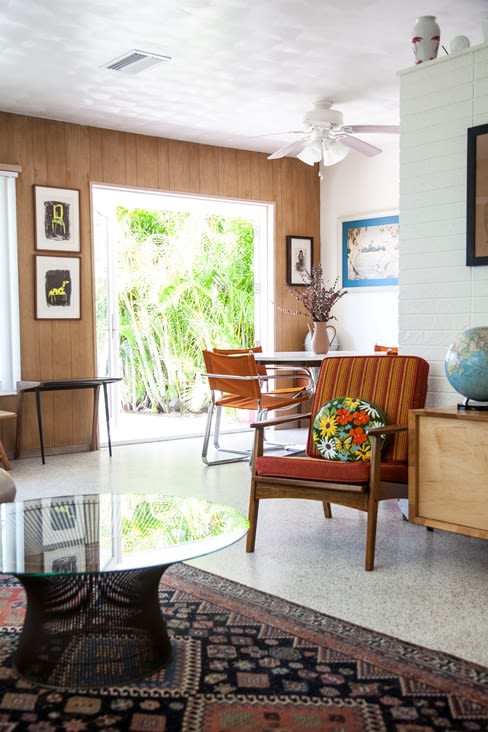Tourism Beat: Turbulence Ahead?
by Cooper Levey-Baker
WITHOUT A DOUBT, they’re the most buzzed-about four syllables in the vacation rental world: Airbnb.
The website is simple. Type in your destination and dates and up pops a list of locals willing to rent out their space. Accommodations range from a humble air mattress, the type of bed that gave the site its name, to an opulent $1,000-a-night, 4,000-square-foot Sarasota School of Architecture treasure on Siesta Key. And those are just two of the more than 1,000 options listed in Sarasota and Manatee counties in early November last year.
Airbnb is hardly the first DIY rental site, but it’s had a deeper impact than any other site like it, mostly thanks to the wide latitude it grants renters and tour-ists and the ease of its reservation system.

Sarasota freelance photographer Jenny Acheson has used Airbnb almost since the site launched in 2008. She owns an apartment in the ultra-hip Brooklyn neighborhood of Williamsburg. When she moved to Sarasota, she started using Airbnb to book short-term rentals, which she found to be much more lucrative than long-term arrangements. At one point, Acheson was earning $245 a night for access to her 900-square-foot Williamsburg loft.
The arrangement was such a boon, in fact, that when Acheson and her husband were looking to buy property on Lido Key, they specifically searched for a place that would be appealing on Airbnb. Acheson now lists three separate “Lido Beach House” units on the site.
The idea of inviting a stranger to crash in your home might give you the willies, but Acheson says she’s never had major problems. One plus of the site is that property owners can review their guests, which can alert fellow users to shady tourist behavior.
It’s difficult to pinpoint exactly how big an impact Airbnb is having on Suncoast tourism. Sarasota County deputy tax collector Liz Klaber says her office can only directly trace around $5,000 in tourist development tax dollars from the first 10 months of 2014 back to the site, a tiny amount considering the county collected $915,000 in August alone. But since those paying the tax don’t have to specify the exact source of their rental income, it’s impossible to know exactly how much money is changing hands through Airbnb. According to Debbie Meihls, executive manager of the Bradenton Area Convention & Visitors Bureau, hotels in Manatee County have seen no drop-off in revenue because of the site.
Airbnb entrepreneurs must pay tourist development and sales taxes.
Visit Sarasota County president Virginia Haley says the site’s impact here may be minimal because of the region’s huge number of short-term condo rentals. Out of approximately 15,000 Sarasota County rental units, only 5,000 or so are traditional hotel or motel rooms, she points out. The appeal of Airbnb in a city like New York is that you don’t need to pay exorbitant hotel rates. But in Sarasota, tourists have always had plenty of non-hotel options.
Still, as Haley points out, many Airbnb listings may not be legal. The office of New York State attorney general Eric T. Schneiderman recently issued a re-port claiming that 72 percent of New York City Airbnb rental units violate zoning laws and other regulations. In Sarasota County, the zoning code prohibits rentals shorter than 30 days except in designated areas on barrier islands. Violators face a fine of up to $250 per day.
Within the city of Sarasota, the rules are also strict. For rentals shorter than eight days, property owners must follow all the same regulations as hotels and B&Bs.
So if you’re interested in renting out your place, that’s your first step: Find out if you can do it legally by contacting the zoning department in your county or municipality. The second step: Pay your taxes. Airbnb entrepreneurs must pay both the 5 percent tourist development tax to the county, plus a 7 percent sales tax to the state. In addition to your taxes, Airbnb charges a 3 percent fee for use of the site.

When Acheson first got started on Airbnb, she looked at properties near her Williamsburg loft to gauge initial pricing, then slowly raised it. Small details, like the apartment’s proximity to the subway, its views of the Williamsburg Bridge, etc., made her property more attractive than the competition. The higher price also means the apartment remains empty at times, allowing her to visit New York, too.
Another tip from Acheson, appropriate coming from a professional photographer: Take good photos. Airbnb is a graphic-heavy site, and bright, colorful images that show tourists exactly what they’re in for lead to success. In fact, a small number of property owners make a disproportionate chunk of the money on Airbnb. The Schneiderman report found that the top 6 percent of owners made 37 percent of the revenue.
Hotels and other traditional rental companies may cry foul about Airbnb’s success, but users say the site offers flexibility to travelers and extra income for those with space to spare. New York hotels may not like the competition she provides, Acheson admits: “I quite frankly don’t care.” ■